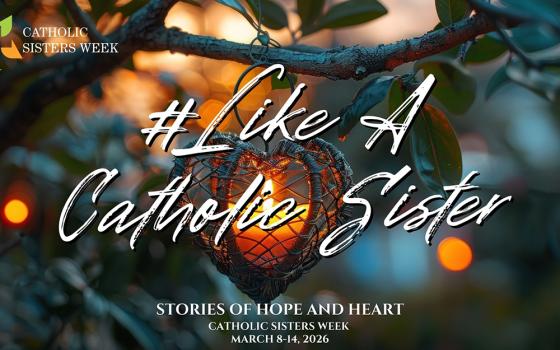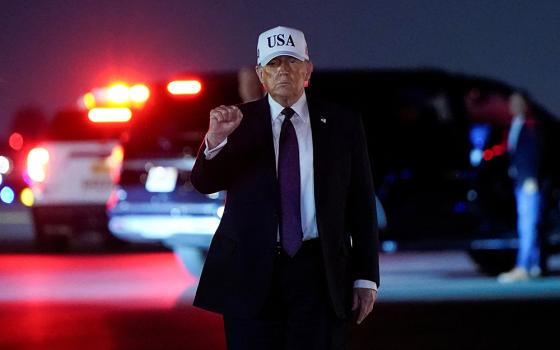Vice President Kamala Harris walks with her great-niece Amara Ajagu to the White House in Washington Jan. 20, 2021, during the Inauguration Day parade. (CNS/Reuters/Andrew Kelly)
Jan. 20, 2021, dawned with an overwhelming sense of relief for many of us, not just in the United States but around the world. The sight of the new president and the first woman of color to become vice president gladdened many hearts and brought tears to many eyes. The last four years, and especially the events of the past year, have been extremely traumatizing. It is indeed appropriate to be happy and delight in leadership that seems to embrace diversity and to experience renewed hope as decency and kindness are modeled from the highest offices. We can perhaps walk a little straighter and taller in America than we have done in recent days.
Inaugural poet Amanda Gorman proclaimed, "Scripture tells us to envision that everyone shall sit under their own vine and fig tree, and no one shall make them afraid." Still, it is very hard — almost impossible — for me to imagine a United States in which I will not be afraid. I know I am not alone as I say this; many Black, Brown and Indigenous folks would echo this sentiment.
I am still pretty sheltered from the rawness of what it means to be Black in America. Living in neighborhoods devastated over the years by redlining and the migration to the suburbs, the looting that occurred in the protests did not alter these landscapes much.
My Kikuyu name affords me some slight protection from the profiling that American Black English names are subjected to by hiring managers all over this country. My religious sister identity opens many doors to me that are out of reach for my Black siblings.
Advertisement
But I am also very cognizant that my distress call to 911 might be answered by an officer who sees me as "less than;" that the medic who attends me in the emergency room might dismiss my concerns and pain; that my church leaders might ignore or make excuses for those who treat me differently; that I could be in danger of random attacks in any number of geographical regions in this country — and all this because of racism, all because the good Lord and evolution gifted me with skin that is close in color to milk chocolate in winter and dark chocolate in the summer.
The demands for unity we keep hearing, especially from the perpetrators of violence, fall short for me. I have struggled with imagining reconciliation, a value and a practice that I espouse in most of my other work. I saw images from the violence inflicted on protestors during the Black Lives Matter marches of last summer; I saw the storming of the Capitol on Jan. 6; I have read some of the social media posts by white supremacists; I have experienced people in my circles brushing over these happenings. We cannot demand mercy and forgiveness from victims without creating space for truth and justice. All four have to be present in order for true reconciliation to reign: "Mercy and truth have met each other: justice and peace have kissed" (Psalm 85:11).
Even as my heart has rejoiced with each executive order President Joe Biden has signed and with every article I've read about his social justice priorities, I am aware that more than 74 million people supported the previous president and that these people walk among us. Former President Donald Trump was not an aberration — not at all. Many presidents before him rode to power by criminalizing Black and Brown bodies. The wealth that this country boasts was forged in the subjugation, pain and tears of Black, Indigenous and Brown folks. This is American history, but it is not just in our past, as the election results clearly demonstrated.
A person celebrates at Black Lives Matter Plaza in Washington, D.C., Jan. 20, 2021, after Joe Biden was sworn in as the 46th president of the United States and Kamala Harris was sworn in as the first Black person, first woman and first Asian American as vice president at the Capitol. (CNS/Reuters/Eduardo Munoz)
This is why the work for justice must not slow down; in fact, we should take advantage of the opportunities the change in leadership is creating to demand even more and with great urgency. This is not the time to rest on your laurels, White allies, because the work is nowhere near done. Gird your loins because the journey we are on is for a lifetime.
Let us make space for truth, which should lead to justice, and perhaps then victims will be able to proffer mercy to the perpetrators and peace will truly reign in this land. Let us speak the truth of why American Descendants of Slavery are yet to rise to the highest offices of this land. Let us speak the truth of the systematic eradication and silencing of Native Americans. Let us refuse the gatekeeping that is often at play in spaces of faith and the narrow subjective interpretations of the Bible that result in excluding some of God's creation.
And to paraphrase Amanda Gorman, let us not be turned around or interrupted by intimidation, because we know our inaction and inertia will be the inheritance of the next generation.







